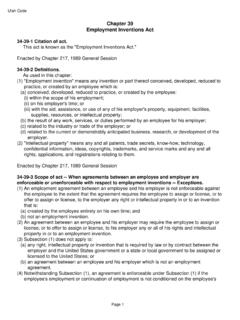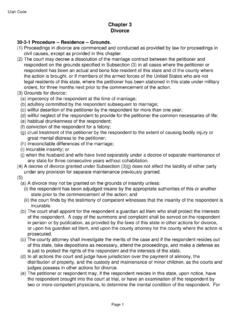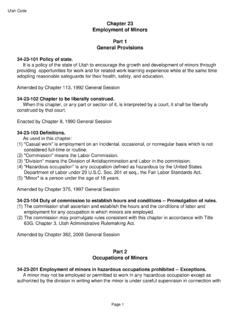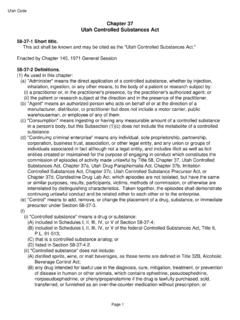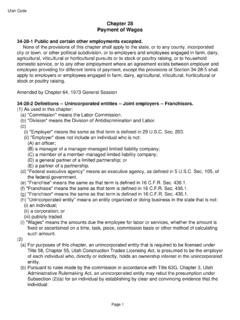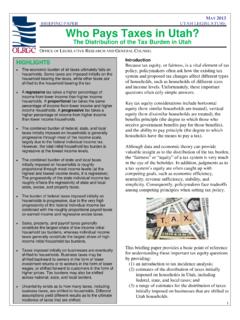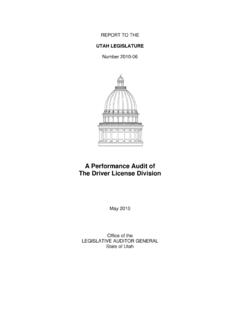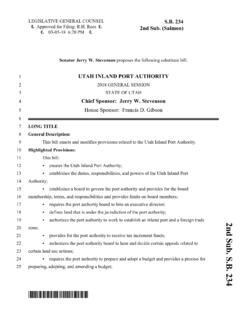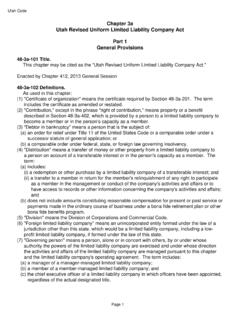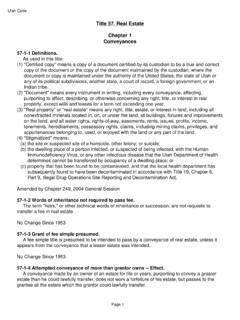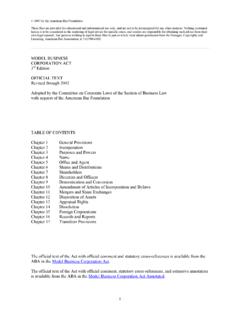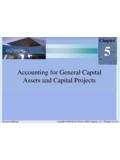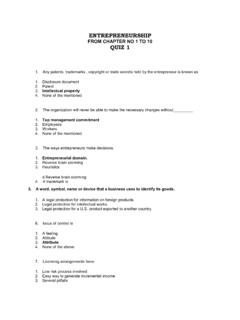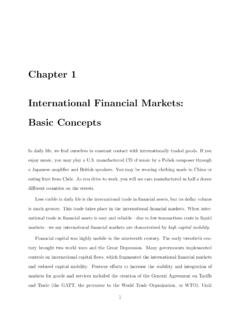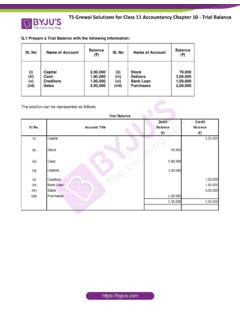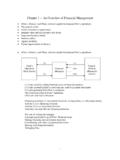Transcription of Utah Code Part 1 Utah Uniform Trust Code General ...
1 Utah CodePage 1 chapter 7 Utah Uniform Trust CodePart 1 General Provisions75-7-101 Title. This chapter is known as the "Utah Uniform Trust Code."Repealed and Re-enacted by chapter 89, 2004 General Session75-7-102 Scope. This chapter applies to trusts as defined in Section by chapter 89, 2004 General Session75-7-103 Definitions.(1) In this chapter :(a) "Action," with respect to an act of a trustee, includes a failure to act.(b) "Beneficiary" means a person that:(i) has a present or future beneficial interest in a Trust , vested or contingent; or(ii) in a capacity other than that of trustee, holds a power of appointment over Trust property.(c) "Charitable Trust " means a Trust , or portion of a Trust , created for a charitable purposedescribed in Subsection 75-7-405(1).(d) "Environmental law" means a federal, state, or local law, rule, regulation, or ordinance relatingto protection of the environment.(e) "Interests of the beneficiaries" means the beneficial interests provided in the terms of thetrust.
2 (f) "Jurisdiction," with respect to a geographic area, includes a state or country.(g) "Power of withdrawal" means a presently exercisable General power of appointment otherthan a power exercisable only upon consent of the trustee or a person holding an adverseinterest.(h) "Qualified beneficiary" means a beneficiary who, on the date the beneficiary's qualification isdetermined:(i) is a current distributee or permissible distributee of Trust income or principal; or(ii) would be a distributee or permissible distributee of Trust income or principal if the trustterminated on that date.(i) "Resident estate" or "resident Trust "means:(i) an estate of a decedent who at death was domiciled in this state;(ii) a Trust , or a portion of a Trust , consisting of property transferred by will of a decedent who athis death was domiciled in this state; or(iii) a Trust administered in this state.(j) "Revocable," as applied to a Trust , means revocable by the settlor without the consent of thetrustee or a person holding an adverse interest.
3 (k) "Settlor" means a person, including a testator, who creates, or contributes property to, a more than one person creates or contributes property to a Trust , each person is a settlor ofUtah CodePage 2the portion of the Trust property attributable to that person's contribution except to the extentanother person has the power to revoke or withdraw that portion.(l) "Spendthrift provision" means a term of a Trust which restrains both voluntary and involuntarytransfer or encumbrance of a beneficiary's interest.(m) "Terms of a Trust " means:(i) except as otherwise provided in Subsection (1)(m)(ii), the manifestation of the settlor's intentregarding a Trust 's provisions as:(A) expressed in the Trust instrument; or(B) established by other evidence that would be admissible in a judicial proceeding;(ii) the Trust 's provisions as established, determined, or amended by:(A) a trustee or Trust director in accordance with the applicable law;(B) court order; or(C) a nonjudicial settlement agreement under Section 75-7-110.
4 (n) " Trust instrument" means an instrument executed by the settlor that contains terms of thetrust, including any amendments thereto.(2) Terms not specifically defined in this section have the meanings provided in Section by chapter 348, 2020 General Session75-7-104 Knowledge.(1) Subject to Subsection (2), a person has knowledge of a fact if the person:(a) has actual knowledge of it;(b) has received a notice or notification of it; or(c) from all the facts and circumstances known to the person at the time in question, has reasonto know it.(2) An organization that conducts activities through employees has notice or knowledge of afact involving a Trust only from the time the information was received by an employee havingresponsibility to act for the Trust , or would have been brought to the employee's attention ifthe organization had exercised reasonable diligence. An organization exercises reasonablediligence if it maintains reasonable routines for communicating significant information to theemployee having responsibility to act for the Trust and there is reasonable compliance withthe routines.
5 Reasonable diligence does not require an employee of the organization tocommunicate information unless the communication is part of the individual's regular duties orthe individual knows a matter involving the Trust would be materially affected by the by chapter 89, 2004 General Session75-7-105 Default and mandatory rules.(1) Except as otherwise provided in the terms of the Trust , this chapter governs the duties andpowers of a trustee, relations among trustees, and the rights and interests of a beneficiary.(2) Except as specifically provided in this chapter , the terms of a Trust prevail over any provision ofthis chapter except:(a) the requirements for creating a Trust ;(b) subject to Sections 75-12-109, 75-12-111, and 75-12-112, the duty of a trustee to act in goodfaith and in accordance with the purposes of the Trust ;(c) the requirement that a Trust and the terms of the Trust be for the benefit of the Trust 'sbeneficiaries;Utah CodePage 3(d) the power of the court to modify or terminate a Trust under Sections 75-7-410 through75-7-416;(e) the effect of a spendthrift provision, Section 25-6-502, and the rights of certain creditorsand assignees to reach a Trust as provided in Part 5, Creditor's Claims - Spendthrift andDiscretionary Trusts;(f) the power of the court under Section 75-7-702 to require, dispense with, or modify or terminatea bond;(g) the effect of an exculpatory term under Section 75-7-1008.
6 (h) the rights under Sections 75-7-1010 through 75-7-1013 of a person other than a trustee orbeneficiary;(i) periods of limitation for commencing a judicial proceeding; and(j) the subject-matter jurisdiction of the court and venue for commencing a proceeding asprovided in Sections 75-7-203 and by chapter 153, 2019 General Session75-7-106 Common law of trusts -- Principles of equity. The common law of trusts and principles of equity supplement this chapter , except to the extentmodified by this chapter or laws of this by chapter 89, 2004 General Session75-7-107 Governing law.(1) For purposes of this section:(a) "Foreign Trust " means a Trust that is created in another state or country and valid in the stateor country in which the Trust is created.(b) "State law provision" means a provision that the laws of a named state govern the validity,construction, and administration of a Trust .(2) If a Trust has a state law provision specifying this state, the validity, construction, andadministration of the Trust are to be governed by the laws of this state if any administration ofthe Trust is done in this state.
7 (3) For all trusts created on or after December 31, 2003, if a Trust does not have a state lawprovision, the validity, construction, and administration of the Trust are to be governed by thelaws of this state if the Trust is administered in this state.(4) A Trust shall be considered to be administered in this state if:(a) the Trust states that this state is the place of administration, and any administration of the trustis done in this state; or(b) the place of business where the fiduciary transacts a major portion of its administration of thetrust is in this state.(5) If a foreign Trust is administered in this state as provided in this section, the following provisionsare effective and enforceable under the laws of this state:(a) a provision in the Trust that restricts the transfer of Trust assets in a manner similar to Section25-6-502;(b) a provision that allows the Trust to be perpetual; or(c) a provision that is not expressly prohibited by the law of this state.
8 (6) A foreign Trust that moves its administration to this state is valid whether or not the trustcomplied with the laws of this state at the time of the Trust 's creation or after the Trust 's CodePage 4(7) Unless otherwise designated in the Trust instrument, a Trust is administered in this state if itmeets the requirements of Subsection (4).Amended by chapter 204, 2017 General Session75-7-108 Principal place of administration.(1) Without precluding other means for establishing a sufficient connection with the designatedjurisdiction, terms of a Trust designating the principal place of administration are valid andcontrolling if:(a) a trustee's principal place of business is located in or a trustee is a resident of the designatedjurisdiction; or(b) all or part of the administration occurs in the designated jurisdiction.(2) A trustee is under a continuing duty to administer the Trust at a place appropriate to itspurposes, its administration, and the interests of the beneficiaries.
9 (3) Without precluding the right of the court to order, approve, or disapprove a transfer, the trustee,in furtherance of the duty prescribed by Subsection (2), may transfer the Trust 's principal placeof administration to another state or to a jurisdiction outside of the United States.(4) The trustee shall notify the qualified beneficiaries of a proposed transfer of a Trust 's principalplace of administration not less than 60 days before initiating the transfer. The notice ofproposed transfer must include:(a) the name of the jurisdiction to which the principal place of administration is to be transferred;(b) the address and telephone number at the new location at which the trustee can be contacted;(c) an explanation of the reasons for the proposed transfer;(d) the date on which the proposed transfer is anticipated to occur; and(e) the date, not less than 60 days after the giving of the notice, by which the qualified beneficiarymust notify the trustee of an objection to the proposed transfer.
10 (5) The authority of a trustee under this section to transfer a Trust 's principal place of administrationterminates if a qualified beneficiary notifies the trustee of an objection to the proposed transferon or before the date specified in the notice.(6) In connection with a transfer of the Trust 's principal place of administration, the trustee maytransfer some or all of the Trust property to a successor trustee designated in the terms of thetrust or appointed pursuant to Section by chapter 89, 2004 General Session75-7-109 Methods and waiver of notice.(1) Notice to a person under this chapter or the sending of a document to a person under thischapter must be accomplished in a manner reasonably suitable under the circumstancesand likely to result in receipt of the notice or document. Permissible methods of notice or forsending a document include first-class mail, personal delivery, delivery to the person's lastknown place of residence or place of business, or a properly directed electronic message.
